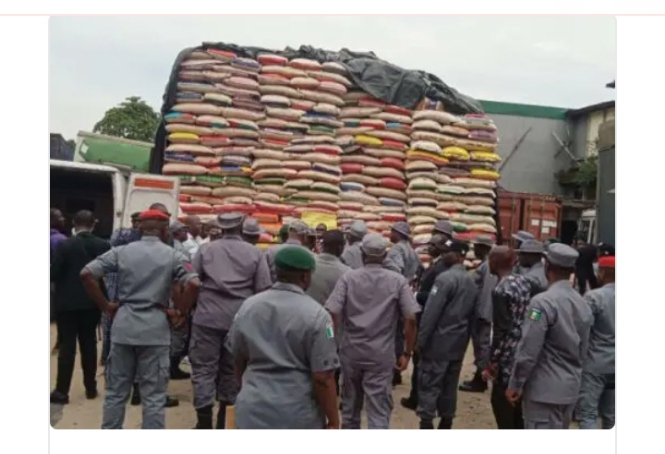 The Nigeria Customs Service, NCS, will today commence the sale of seized bags of rice to the public at the rate of N10,000 per 25kg .
The Nigeria Customs Service, NCS, will today commence the sale of seized bags of rice to the public at the rate of N10,000 per 25kg .
Disclosing this to newsmen in Lagos, Comptroller General of the NCS, Mr. Adewale Adeniyi, said the process for the sale of the food items has been perfected such that a form with all the details of the applicant including the National Identification Number, NIN, will be submitted and a bar code will be generated for the collection of the commodity.
Adeniyi stated that ten registration points will be opened for members of the public with a view to easing the purchase process.
The Customs boss said that the moves to sell the seized items is to crash the price of food items and the shore up the value of the Naira.
He warned against the resale of purchased rice adding anybody caught reselling will be arrested and possibly prosecuted.
He explained that the disposal of these seized items will be for a period of time adding that very poor Nigerians were the target for this gesture.
He said, “In ensuring food security for Nigerians. We are here to shed light on the commitment of the NCS in protecting our society by ensuring the availability of essential food items.
“In recent months, the government has been addressing the challenges faced within our economy, particularly the lagged effects of insecurity and the current exchange rate issues.
“As part of our ongoing commitment to safeguarding the food security of Nigerians, the NCS has secured approval from the government to dispose of these seized food items to needy Nigerians at discounted prices.
“The criteria for Nigerians to benefit from this initiative include having a verifiable National
Identification Number (NIN).
“The target groups include artisans, teachers, nurses, religious bodies, and other Nigerians within our operational areas. The intention is to reach out directly to members through these organized structures to ensure the maximum impact of this exercise.
“To ensure the security and integrity of this initiative, NCS has put in place comprehensive measures. These measures encompass robust security protocols throughout the process. Our officers will be closely monitoring the entire supply chain to prevent any misuse or diversion of the food items.
“Moreover, we have established strict guidelines and eligibility criteria to ensure that the items are distributed only to those in genuine need. Additionally, we will be working closely with relevant agencies to ensure compliance with the terms of this program.
“It is imperative that beneficiaries of this exercise understand that the items are not to be resold. We take a strong stance against any form of profiteering or exploitation of this initiative. We urge Nigerians to report any incidents of misuse or unauthorized resale of the seized food items.
“NCS is fully committed to transparency and accountability in this process, and we will not hesitate to take decisive action against any individuals or entities found to be in violation of the
terms of this program.”
In a related development, the leadership of the NCS disclosed that the agency The challenge of food security have exacerbated concerns which has led to a concerning trend where food items are moving out massively to neighbouring countries.
He further disclosed that over 20,000 bags of assorted grains (Rice, beans, Maize, Guinea corn, millet, Soya beans, 2500 cartons and 963 bags of dried fish. Others include, Dried pepper, tomatoes, cooking oil, Maggi, Macaroni, salt, sugar, garri.
“This trend is not sustainable as it puts pressure on our productive capacity and threatens our food security.
“To address this, the NCS has remained responsive in carrying out its mandate to protect our borders from the inflow and outflow of restricted goods. One concerning trend noticed is the outflow of food items in huge quantities, posing a threat to our food security. It should be noted that the condition for the export of any item is only met upon fulfilling sufficiency internally.
“In this regard, food items deemed not to fulfil these conditions are showing up in our interceptions made at the borders. We will continue to advance the nation’s goals and objectives by aligning with the administration’s policies and aspirations for a prosperous Nigeria.
“NCS is dedicated to executing its duties with excellence and efficiency. Recognizing the significance of its responsibility to protect the society and facilitate trade, the NCS remains steadfast in its commitment to safeguarding national interests and ensuring the well-being of all Nigerians.
“Furthermore, the NCS is committed to fostering a culture of transparency, accountability, and public service. By upholding the highest standards of integrity,” he stated.
Post Views: 909



 Disturbed by the state of training institutions for the Nigeria Police Force (NPF), Nigeria Security and Civil Defence Corps (NSCDC) and other internal security agencies, President Bola Tinubu has declared emergency on the facilities.
Disturbed by the state of training institutions for the Nigeria Police Force (NPF), Nigeria Security and Civil Defence Corps (NSCDC) and other internal security agencies, President Bola Tinubu has declared emergency on the facilities. 
 The Niger Delta Development Commission, NDDC, is hosting a two-day strategic meeting with commissioners, permanent secretaries, and directors of agriculture, fisheries & livestock in the nine Niger Delta states.
The Niger Delta Development Commission, NDDC, is hosting a two-day strategic meeting with commissioners, permanent secretaries, and directors of agriculture, fisheries & livestock in the nine Niger Delta states.










